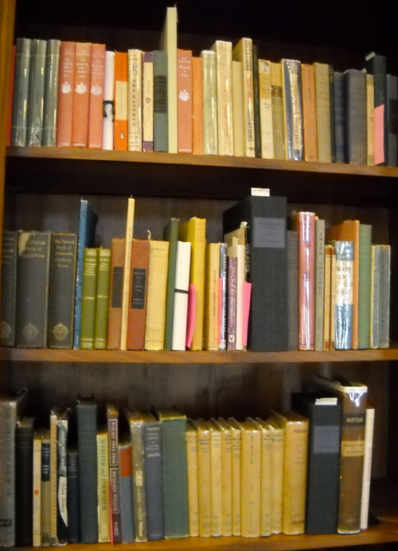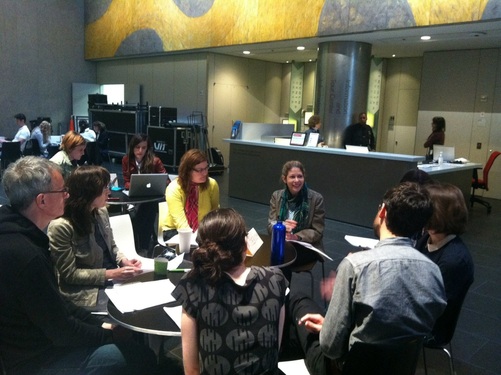Research

Part of Sylvia Plath's Library. Mortimer Rare Book Room, Smith College.
Since 2001, I have been studying Sylvia Plath's reading, teaching, and the annotated books in her personal library, housed in the Mortimer Rare Book Room at Smith College and the Lilly Library at Indiana University.
My book, Annotating Modernism: Marginalia and Pedagogy from Virginia Woolf to the Confessional Poets (Routledge, 2020), addresses the history of modernism in academic institutions, analyzing the reading and teaching strategies of modernist and postwar writers. Following an introduction examining modernist writers' reading and annotating strategies (including Virginia Woolf, E. M. Forster, James Joyce, T. S. Eliot, and Ezra Pound), the chapters analyze the personal libraries and teaching notes of Sylvia Plath, John Berryman, and Anne Sexton. The material histories in each chapter illustrate postwar poets' engagement with and role in shaping midcentury modernist critical discourse.
The conclusion of Annotating Modernism considers Ted Hughes's marginalia and preparation for teaching. His library was acquired by Emory University in 2003 and includes a copy of Fyodor Dostoevksy's Crime and Punishment that Sylvia Plath annotated to teach in her first year English course at Smith College in 1958 and Hughes subsequently annotated to teach in his Great Books course at the University of Massachusetts, Amherst. You can read more about this artifact and see images of it in my essay, "Ted Hughes and the Midcentury American Academy" in The Ted Hughes Society Journal 3 (2013).
My research for Annotating Modernism draws on materials in a wide range of archives, including the Mortimer Rare Book Room at Smith College, the Lilly Library at Indiana University, Bloomington, Emory University's Manuscript, Archives, and Rare Book Library, the University of Texas-Austin's Harry Ransom Humanities Research Center, the University of Minnesota, Columbia University, the British Library, the Berg Collection at the New York Public Library, the Houghton Library at Harvard, and the Schlesinger Library at Radcliffe.
Below I have included a clip of my featured presentation, "Transnational Plath: Writing 'Purdah,'" from the Sylvia Plath Symposium held at Indiana University in 2012.
My book, Annotating Modernism: Marginalia and Pedagogy from Virginia Woolf to the Confessional Poets (Routledge, 2020), addresses the history of modernism in academic institutions, analyzing the reading and teaching strategies of modernist and postwar writers. Following an introduction examining modernist writers' reading and annotating strategies (including Virginia Woolf, E. M. Forster, James Joyce, T. S. Eliot, and Ezra Pound), the chapters analyze the personal libraries and teaching notes of Sylvia Plath, John Berryman, and Anne Sexton. The material histories in each chapter illustrate postwar poets' engagement with and role in shaping midcentury modernist critical discourse.
The conclusion of Annotating Modernism considers Ted Hughes's marginalia and preparation for teaching. His library was acquired by Emory University in 2003 and includes a copy of Fyodor Dostoevksy's Crime and Punishment that Sylvia Plath annotated to teach in her first year English course at Smith College in 1958 and Hughes subsequently annotated to teach in his Great Books course at the University of Massachusetts, Amherst. You can read more about this artifact and see images of it in my essay, "Ted Hughes and the Midcentury American Academy" in The Ted Hughes Society Journal 3 (2013).
My research for Annotating Modernism draws on materials in a wide range of archives, including the Mortimer Rare Book Room at Smith College, the Lilly Library at Indiana University, Bloomington, Emory University's Manuscript, Archives, and Rare Book Library, the University of Texas-Austin's Harry Ransom Humanities Research Center, the University of Minnesota, Columbia University, the British Library, the Berg Collection at the New York Public Library, the Houghton Library at Harvard, and the Schlesinger Library at Radcliffe.
Below I have included a clip of my featured presentation, "Transnational Plath: Writing 'Purdah,'" from the Sylvia Plath Symposium held at Indiana University in 2012.
